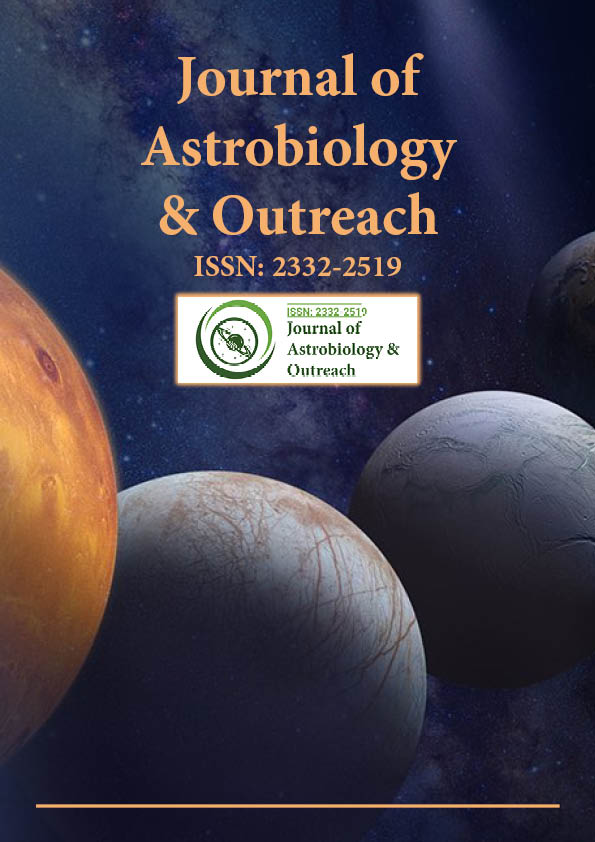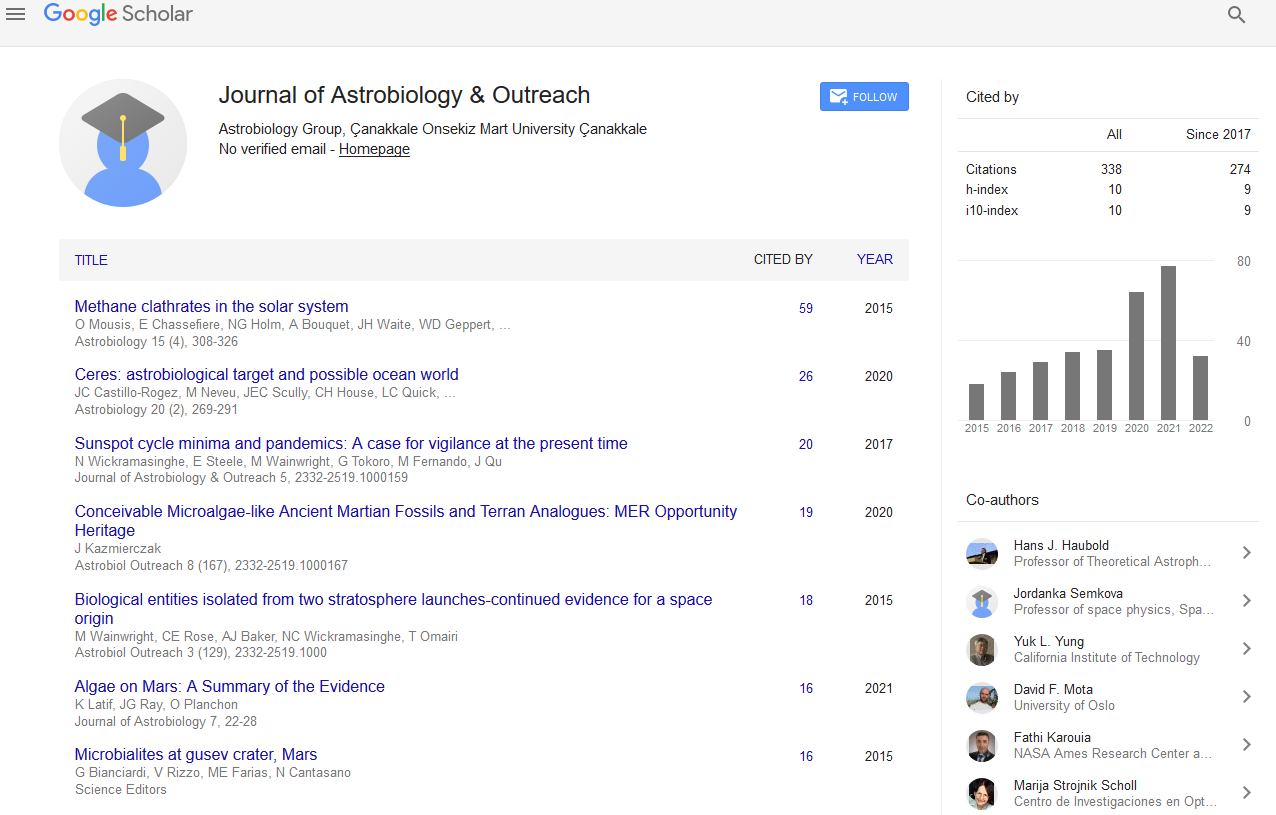Indexed In
- Open J Gate
- Academic Keys
- JournalTOCs
- RefSeek
- Hamdard University
- EBSCO A-Z
- OCLC- WorldCat
- Google Scholar
Useful Links
Share This Page
Journal Flyer

Open Access Journals
- Agri and Aquaculture
- Biochemistry
- Bioinformatics & Systems Biology
- Business & Management
- Chemistry
- Clinical Sciences
- Engineering
- Food & Nutrition
- General Science
- Genetics & Molecular Biology
- Immunology & Microbiology
- Medical Sciences
- Neuroscience & Psychology
- Nursing & Health Care
- Pharmaceutical Sciences
Opinion Article - (2023) Volume 11, Issue 3
Astrobiology: Exploring the Origins and Persistence of Life in the Universe
Wills Hinson*Received: 01-May-2023, Manuscript No. JAO-23-21762; Editor assigned: 03-May-2023, Pre QC No. JAO-23-21762 (PQ); Reviewed: 17-May-2023, QC No. JAO-23-21762; Revised: 24-May-2023, Manuscript No. JAO-23-21762 (R); Published: 31-May-2023, DOI: 10.35248/2332-2519.23.11.295
Description
Astrobiology, a captivating and interdisciplinary field, delves into the fundamental questions surrounding the origin and persistence of life. By investigating the factors that contribute to life's emergence and sustenance on earth and potentially other celestial bodies, astrobiology not only deepens our understanding of our own existence but also expands our horizons to the possibilities of life elsewhere in the universe. This perspective explores the key elements studied in astrobiology, from the conditions necessary for life's origin to the environments that support its survival, shedding light on the broader implications and exciting prospects of this fascinating field.
Life’s origins: tracing the path
Astrobiology seeks to unravel the mysteries of life's origins by investigating the chemical and physical processes that led to the emergence of life on earth. Scientists study the early earth's conditions, including its atmosphere, oceans, and geology, to understand how the building blocks of life, such as amino acids and nucleotides, could have formed. Exploring environments with extreme conditions, such as hydrothermal vents and icy moons, offers insight into the potential habitats where life might arise.
Moreover, astrobiologists examine the concept of panspermia, which proposes that life could have originated elsewhere in the universe and been transported to earth via interstellar objects or meteorites. By analyzing the chemical composition of these extraterrestrial samples, researchers gain clues about the possibility of life's existence beyond our planet.
Habitability: nurturing life's continuity
Understanding the habitability of environments, both on earth and beyond, is a central focus of astrobiology. Scientists investigate the conditions necessary for life to persist and thrive, including the availability of liquid water, the presence of essential elements and compounds, and the energy sources that sustain metabolic processes.
Studying extreme environments on earth, such as deserts, deepsea hydrothermal vents, and acidic lakes, provides insights into the limits of life's adaptability. These investigations expand our understanding of potential habitats in the solar system and beyond, such as Mars, Europa, and Enceladus, where life could conceivably exist.
Astrobiology also explores the concept of habitable zones around stars, where the conditions are conducive to liquid water. By identifying exoplanets within these zones and characterizing their atmospheres, researchers assess their potential for supporting life. The discovery of exoplanets with similar properties to earth offers tantalizing possibilities for habitability and the existence of extraterrestrial life.
Implications for life beyond earth
Astrobiology has profound implications for the search for extraterrestrial life and our place in the universe. The ongoing exploration of Mars, with rovers and future sample return missions, aims to uncover evidence of past or present life on the red planet. The study of icy moons, such as Europa and Enceladus, offers potential habitats for life beneath their frozen surfaces, in subsurface oceans warmed by tidal forces. These investigations provide opportunities to assess the prevalence and diversity of life beyond earth.
Moreover, astrobiology's interdisciplinary approach fosters collaboration across scientific disciplines. Astronomy, biology, chemistry, geology, and planetary science converge in the pursuit of understanding life's potential existence elsewhere. The synergy between these fields not only expands our knowledge but also inspires technological advancements, such as remote sensing instruments and robotic exploration, which aid in the search for extraterrestrial life.
By exploring the factors related to the origin and survival of life, astrobiology also raises existential questions about our own place in the cosmos. Reflecting on the vastness and diversity of the universe, astrobiology encourages contemplation of life's interconnectedness and our responsibility as stewards of life on Earth.
Conclusion
Astrobiology's comprehensive study of the factors influencing life's origin and survival offers profound insights into our place in the universe. By examining the conditions necessary for life's emergence, the habitability of diverse environments, and the implications for life beyond earth, astrobiology pushes the boundaries of our knowledge. As we continue to explore and understand the complexities of life's existence, astrobiology inspires awe and fuels our quest to uncover the mysteries of our origins while keeping our eyes on the possibilities of life in the cosmos.
Citation: Hinson W (2023) Astrobiology: Exploring the Origins and Persistence of Life in the Universe. J Astrobiol Outreach. 11.295.
Copyright: © 2023 Hinson W. This is an open-access article distributed under the terms of the Creative Commons Attribution License, which permits unrestricted use, distribution, and reproduction in any medium, provided the original author and source are credited.

